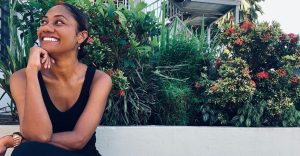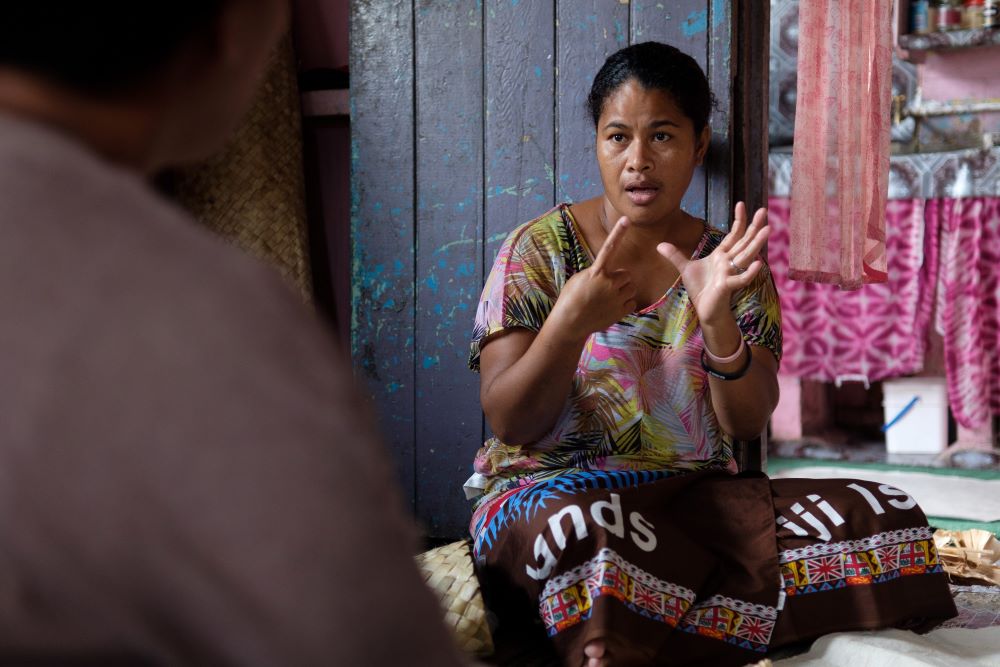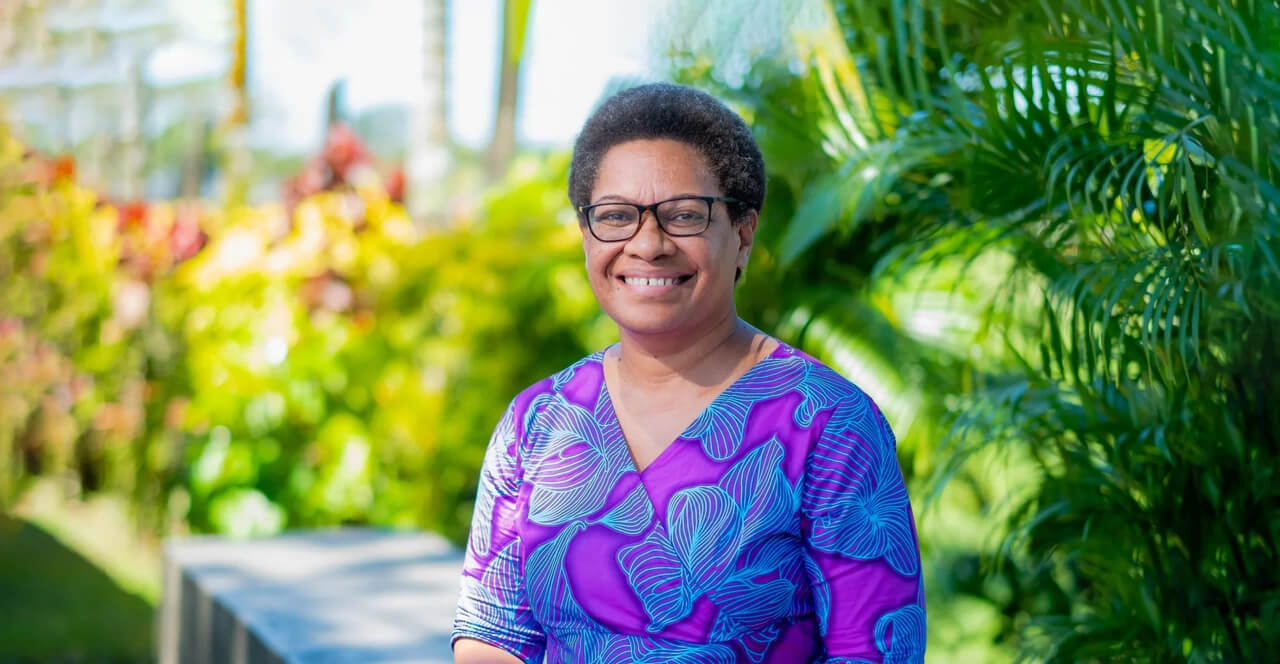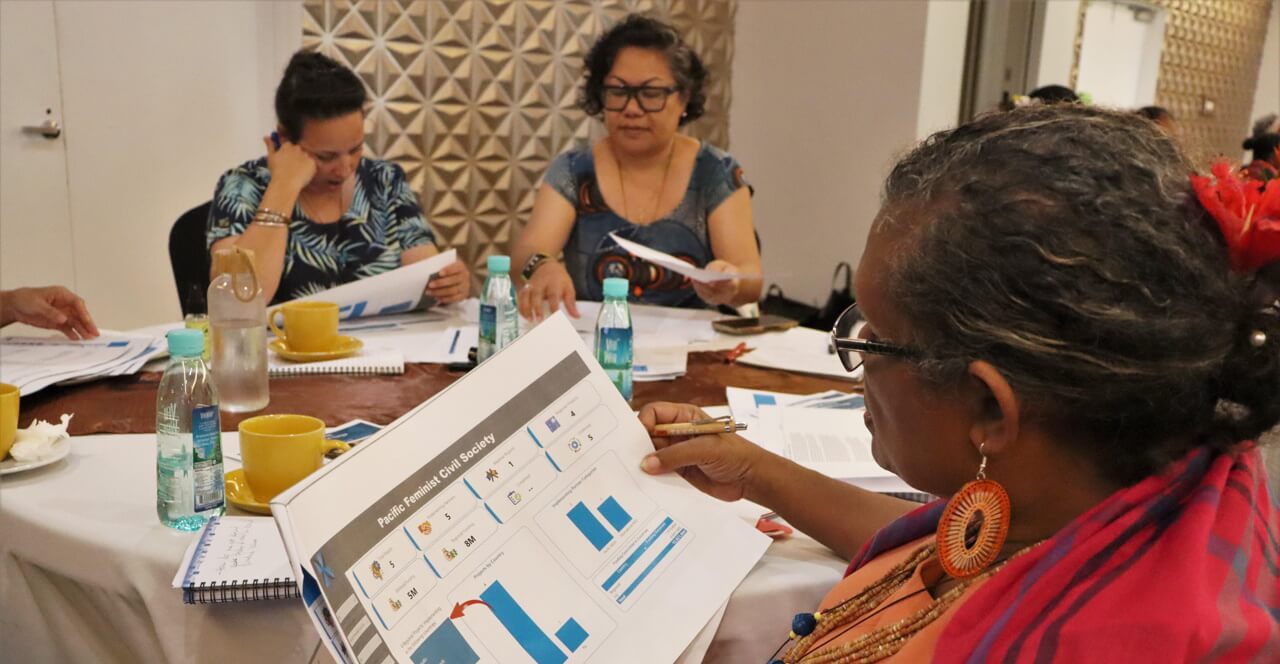Monitoring disability inclusion: Towards the realisation of rights
24 April 2024Co-authored by Sally Baker (Disability Inclusion Specialist – Pacific Women Lead Quality and Technical Assurance Group) and Arti Devi (Database Officer for Pacific Women Lead at SPC), this blog provides insight into an inclusion tool, a guidance note for “Reporting on Disability Inclusion”, for grantee partners under the Pacific Women Lead portfolio.
The Pacific Women Lead (PWL) at the Pacific Community (SPC) programme, termed PWL at SPC, has more than AUD 55 million dedicated to its work under the Australian Government’s AUD 170 million Pacific Women Lead portfolio. This partnership with the Australian Government commits SPC to deliver the PWL programme, as the cornerstone for the portfolio.
In the vast expanse of the Pacific, where diverse cultures intertwine and flourish, there exists a population often overlooked and underserved: individuals with disabilities.
People with disabilities make up around 16% of the region’s inhabitants, yet face formidable barriers to essential services and opportunities, perpetuating a cycle of marginalisation across social, economic, and political realms. The Pacific statistics are sobering— less than 10% of children with disabilities attend school, and unemployment rates range from 50% to a staggering 90%. Poverty and disability intertwine, deepening economic disparities.
Amidst this narrative of inequality, an even more troubling trend emerges: the disproportionate challenges faced by women and girls with disabilities. Across many Pacific nations, gender compounds the barriers to education and employment, with women with disabilities particularly sidelined. Social norms, stigma, and discrimination entrench these disparities, limiting participation across various spheres of life and rendering women and girls with disabilities more vulnerable to abuse. Yet, amid these challenges, glimmers of hope emerge.
Pacific Island countries have taken strides towards inclusivity and equity, signing on to the Convention on the Rights of Persons with Disabilities (CRPD) and committing to frameworks that prioritise the rights of all individuals, including women and girls with disabilities. Realising disability equity and rights requires stakeholders to drive meaningful change through concrete actions and accountability.
Pacific Women Lead: Learning Lessons
Learning from past experiences from Pacific Women Shaping Pacific Development (PWSPD 2012 – 2022), Pacific Women Lead (PWL) at the Pacific Community (SPC) has developed a practical guidance note to ensure our 58 diverse partners include people with disabilities, and tangible outcomes are captured in our reporting.
Our analysis of PWSPD indicated that partners in two countries had made efforts to reach and include people with disabilities. We undertook to build on this by incorporating intentions to reach and benefit people with disabilities into the end-of-programme outcomes and supporting partners to operationalise these through embedded monitoring, reflection, and reporting processes.
PWSPD experiences also showed us that while quantitative disability data was being gathered, it wasn’t always being recorded, leading to an inability to disaggregate data in a way that helped partners understand whether people with disabilities were being included in initiatives or not.
Recognising this gap, we revised data collection approaches, through changes in partner reporting templates and the incorporation of advice regarding the use of the Washington Group Short Set of Questions, a set of six questions which enable the collection and disaggregation of reliable disability data – in our monitoring and evaluation framework. Data can now be collected and categorised in a manner that differentiates data by age, gender, and type of difficulty. Our grant partners are increasingly reporting quantitative disability data and using this to inform planning.
Importantly, we partnered with Pacific Disability Forum (PDF) to plan and undertake efforts that learn from the past in order to strengthen disability inclusion in our work. In discussion with PDF, we developed and implemented disability-inclusive annual reflection processes, provided professional development to partners in disability inclusion, and developed this guidance note.
Improving inclusion through reporting
Our guidance note Reporting on Disability Inclusion aims to assist partners in reporting on their efforts to achieve disability equity and rights by collecting and sharing 3 types of information:
- Preconditions: The extent to which necessary accommodations, such as access to support services, assistive devices, and accessible venues, have been provided to enable the active participation of women and girls with disabilities in various initiatives. This also includes the extent to which our partners are working in partnership with Organisations of Persons with Disabilities (OPDs) to inform the development and implementation of disability-inclusive initiatives.
- Inclusion: The degree to which an activity has reached and involved people with disabilities, through the collection and disaggregation of quantitative data.
- Participation: the extent to which people with disabilities have been meaningfully and actively involved in initiatives and benefitted from these.
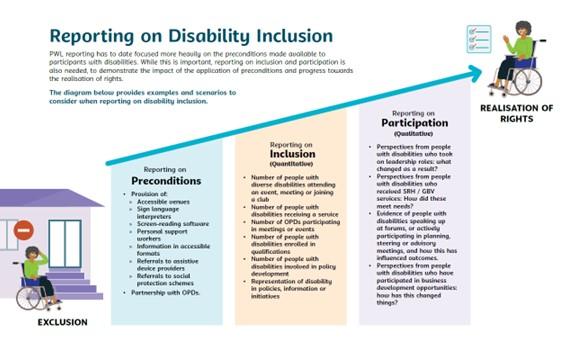
We introduced this guidance note to partners at our Reflections workshop in September last year and sought their feedback before finalising. Many partners have already begun strengthening the way they collect and use a range of disability data to inform reporting and planning.
- SPC has now extended its adoption of the Washington Group Short Set to all event registrations and evaluations, including prominent gatherings such as the Regional Symposium for Cyber Safety, and Pacific Women Lead reflection workshops. This data provides information which enables strategic adjustments to ensure reasonable accommodations are provided to ensure the full participation of people with disabilities.
- Our Pacific Girl partners are increasingly reporting on how their activities have been disability inclusive, including partnering with Pacific Disability Forum to extend invitations for life skills training to adolescent girls with disabilities, and ensuring that the activities, venue, and resources are accessible.
- We have supported our Crisis Centre grant partners to modify client intake forms so that they incorporate the Washington Group Short Set questions to enable disability data collection. Previously, these forms had questions such as “Do you have a disability?” and yes / no response options. This adjustment reflects a concerted effort to improve the inclusivity and precision of data collection methodologies, aligning with our commitment to enhancing reporting on disability inclusion and subsequent planning of future initiatives that contribute to achieving disability equity and rights.
“This guidance note is valuable to me as a Pacific feminist. It’s vital in guiding my work at the Pacific Feminist Fund, a feminist funder. The guidance note is succinct, logical and applicable. Its analysis, as well as applicability in theory and practice in terms of how we can support the realisation of rights for people with disabilities through the lens of preconditions, inclusion and participation, is revolutionary. At the Pacific Feminist Fund, we are using the guidance note to guide our overall work as a feminist funder and grant maker in how we can support the realisation of Pacific people, especially women, girls and non-binary people with disabilities.”
Michelle Reddy, Co-Lead of the Pacific Feminist Fund
What happens next?
Over the next couple of months, we will be socialising the Guidance Note with our partners and presenting it at our next Annual Reflections workshop later this year. Together with the Pacific Disability Forum, we will continue to support our partners in their efforts to incorporate and use disability inclusive monitoring and reporting approaches, as well as assisting them with partnering with OPDs and implementing their activities in a disability-inclusive way.
Moreover, the Human Rights and Social Development Division at SPC, has made strides in advancing its Disability Inclusion Strategy following the 7th Regional Conference for Disability supported by Pacific Women Lead held last year. This is slated for finalisation in 2024.
In the journey towards equality, every individual matters. Through collaborative efforts with our partners, we seek to strengthen reporting mechanisms that enable us to demonstrate and learn from our journey towards disability equity and rights. This, in turn, is influencing implementation approaches, so that they more effectively reach and benefit people with disabilities. Each step taken contributes to a more inclusive and equitable Pacific region.
